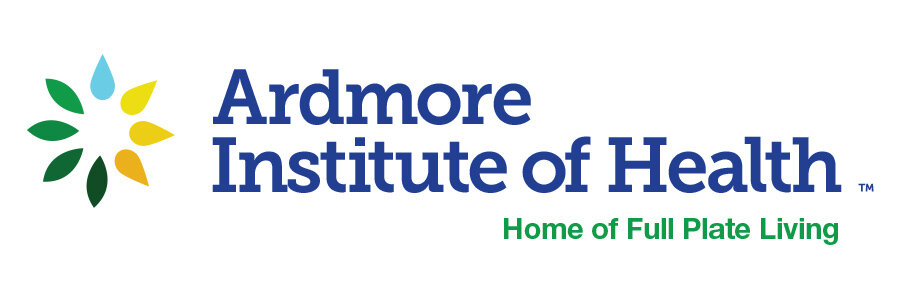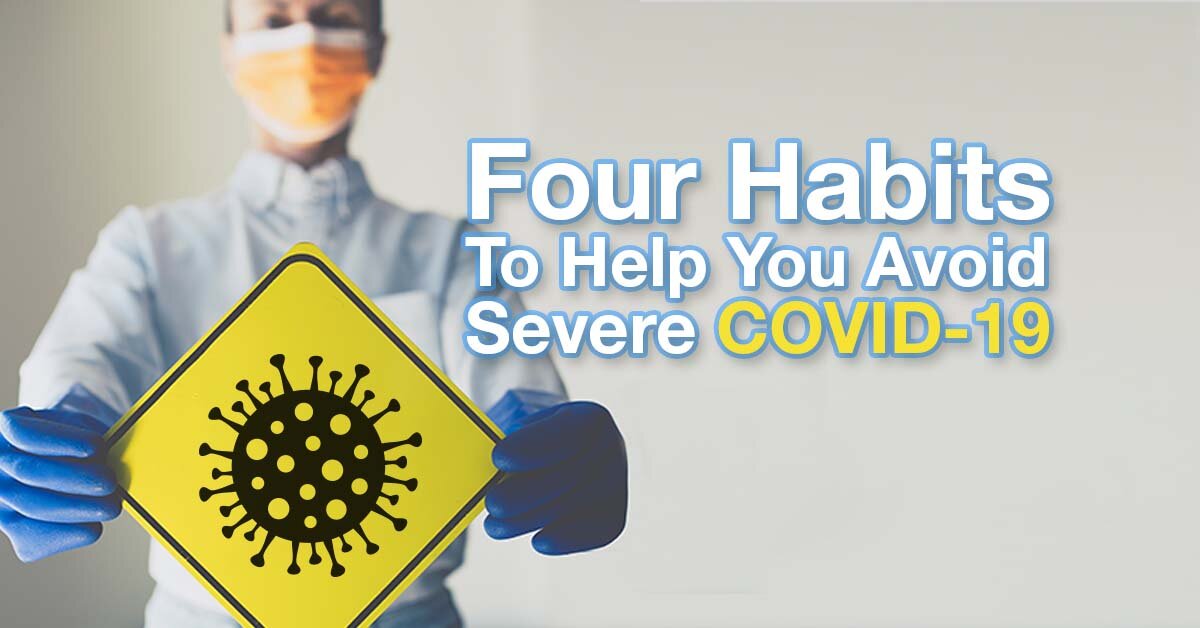Four Habits to Help You Avoid Severe COVID-19 Outcomes
Despite all the gloom and doom you hear about COVID-19, there is a silver lining: there’s a lot you can do to protect yourself and your family.
Here are four habits you can put into practice now that can help you avoid severe COVID-19 outcomes should you contract the virus.
4 Habits to Adopt Now
Eat more plants
Decades of good research studies have shown that plant-based diets, which minimize or eliminate meat and dairy products, help people live longer, healthier, happier lives by preventing, treating, and in some cases even reversing, numerous human disorders and diseases. The collective weight of evidence is so compelling that the American Medical Association recently endorsed them by stating that meat and dairy are optional, not nutritionally required.(1) What about plant-based diets for protection against COVID-19?
Over a two-month period in the summer of 2020, 2,884 frontline physicians and nurses in 5 European countries and the US, who had a high-frequency of exposure to COVID-19 patients, were extensively surveyed, which included collecting dietary information.(2)
After taking into consideration many important characteristics of the participants, researchers found:
Those doctors and nurses who followed a plant-based diet, higher in vegetables, beans, nuts and lower in poultry, red and processed meats, had a 73% lower risk of moderate to severe COVID compared to those who did not follow a plant-based diet.
When they restricted the data to only cases of those with a positive COVID-19 test or detectable antibodies, plant-based diets decreased risk of becoming infected with COVID-19 at all.
Those who followed low carbohydrate, high protein diets had nearly a 4-fold greater risk of moderate-to-severe COVID-19 compared with those who followed plant-based diets.
The authors concluded that plant-based diets are a healthy dietary pattern which may be considered protective against severe COVID-19.
Our recommendation
Work toward eating a largely plant predominant diet. Don’t know where to begin? Start the doable steps in the Full Plate Living Membership we offer at no cost. Want an overview, read about the Full Plate Approach here.
Eat an early, light dinner
We’re probably all familiar with the old adage: eat breakfast like a king, lunch like a prince and supper like a pauper. While that may be good advice, most people today do the opposite, enjoying their largest meal, dinner, at the end of the day. What does that have to do with a serious case of COVID?
Researchers matched the death rate of one million residents as of April 26, 2020 sampled from nine European countries with known dinner times, ranging from 4:00 to 9:00 p.m.(3)
They found:
The earlier the dinner was eaten, the lower the death rate from COVID-19 and vice versa.
The further away the time of the largest meal of the day from bedtime, the lower the death rate from COVID-19 and vice versa.
Our recommendations
It’s well nigh impossible to eat light suppers if you skip breakfast and eat a light lunch. Clearly, by the end of the day you'll be very hungry and ready for a big meal. So, the secret to light suppers is eating satisfying, healthy breakfasts and lunches. We can help with that too.
Examples of light suppers include a big fruit or vegetable salad or bowl of soup.
Here are five fiber-filled breakfast ideas that work for everyone, including those with diabetes, and five fiber-packed lunches.
Be consistently physically active
The Physical Activity Guidelines for Americans recommend at least 150 minutes of moderate physical activity weekly for optimum health.(4) Research has shown regular physical activity helps us live longer, healthier lives, including reduced risk of numerous common, chronic diseases. If a person becomes infected with COVID-19, does their habitual physical activity level affect the outcome of the disease?
Researchers analyzed the data of 48,440 adult patients in the Kaiser Permanente health care system who had confirmed COVID-19 between January and October of 2020.(5)
After taking into consideration many important characteristics of these patients, they found:
Consistently meeting physical activity guidelines (150 minutes/week of moderate physical activity) was strongly associated with reduced risk of severe COVID-19 outcomes: hospitalization, ICU admission and death.
Those who did some physical activity, more than 10 minutes per week, had lower risks of severe COVID-19 outcomes, but not as much as those patients in number one.
Those patients who were consistently inactive, 0-10 minutes per week, had a significantly higher risk of hospitalization, ICU admission and death after getting COVID-19 compared to those patients in number one.
Our recommendations
If you’re not already physically active, clear it with your doctor and start doing the physical activity you find most enjoyable in small, doable steps. Find ways to be consistent with it.
If you’re already physically active but not doing 150 minutes a week, take the time to figure out how you can add more physical activity into your weekly schedule.
Here are a few suggestions to help you get started:
Replace some evening TV time with family activity time, like taking a walk in a local park or, even easier, around your neighborhood.
Walk while talking on the phone.
Take the stairs instead of the elevator whenever possible.
Do some walking during your lunch break, even if it’s only five or 10 minutes, because every minute counts.
Optimize your vitamin D levels
Vitamin D is a fat-soluble vitamin essential to the healthy functioning of the immune system, both innate and adaptive immunity.(6) Low levels of serum 25-hydroxyvitamin D are associated with numerous infections and immune-related diseases and disorders. (7) Is there an association between vitamin D deficiency and severe COVID-19?
A 2020 systematic review and meta-analysis was conducted for the purpose of looking at the association between vitamin D deficiency, defined as 25-hydroxyvitamin D <20ng/mL, and COVID-19 severity by looking at the prevalence of vitamin D deficiency in people with the disease.(8)
The researchers found that among 8,176 COVID-19 patients, individuals with severe COVID-19 present 65% more vitamin D deficiency compared with mild cases of the disease.
Our recommendations
If you don’t know what your vitamin D level is, work with your doctor to get it measured and create a personal regimen to optimize it. Optimum blood levels of 25-hydroxyvitamin D are considered to be 40-60ng/mL.(7)
References
Kim H, Rebholz CM, Hegde S, et al. Plant-based diets, pescatarian diets and COVID-19 severity: a population-based case-control study in six countries. BMJ Nutr Prev Health. 2021;4(1):257-266. Published 2021 Jun 7. doi:10.1136/bmjnph-2021-000272
Verd S, Beiro S, Fernandez-Bernabeu M, Ponce-Taylor J. Early dinner or "dinner like a pauper": Evidence, the habitual time of the largest meal of the day - dinner - is predisposing to severe COVID-19 outcome - death. Chronobiol Int. 2020 Jun;37(6):804-808. doi: 10.1080/07420528.2020.1772810. Epub 2020 Jun 9. Erratum in: Chronobiol Int. 2020 Sep 7;:1. PMID: 32516020.
https://health.gov/sites/default/files/2019-09/Physical_Activity_Guidelines_2nd_edition.pdf
Sallis R, Young DR, Tartof SY, Sallis JF, Sall J, Li Q, Smith GN, Cohen DA. Physical inactivity is associated with a higher risk for severe COVID-19 outcomes: a study in 48 440 adult patients. Br J Sports Med. 2021 Apr 13:bjsports-2021-104080. doi: 10.1136/bjsports-2021-104080. Epub ahead of print. PMID: 33849909; PMCID: PMC8050880.
Hewison M. Vitamin D and immune function: an overview. Proc Nutr Soc. 2012 Feb;71(1):50-61. doi: 10.1017/S0029665111001650. Epub 2011 Aug 18. PMID: 21849106.
Charoenngam N, Holick MF. Immunologic Effects of Vitamin D on Human Health and Disease. Nutrients. 2020;12(7):2097. Published 2020 Jul 15. doi:10.3390/nu12072097
Pereira M, Dantas Damascena A, Galvão Azevedo LM, de Almeida Oliveira T, da Mota Santana J. Vitamin D deficiency aggravates COVID-19: systematic review and meta-analysis. Crit Rev Food Sci Nutr. 2020 Nov 4:1-9. doi: 10.1080/10408398.2020.1841090. Epub ahead of print. Update in: Crit Rev Food Sci Nutr. 2021 Aug 12;:1-6. PMID: 33146028.

